- Home
- Anthony Trollope
The Fixed Period Page 8
The Fixed Period Read online
Page 8
CHAPTER VIII.
THE "JOHN BRIGHT."
Jack, of course, did not go to New Zealand, and I was bound toquarrel with him,--temporarily. They held the meeting on the TownFlags, and many eloquent words were, no doubt, spoken. I did not go,of course, nor did I think it well to read the reports. Mrs Neverbendtook it into her head at this time to speak to me only respecting thematerial wants of life. "Will you have another lump of sugar in yourtea, Mr President?" Or, "If you want a second blanket on your bed,Mr Neverbend, and will say the word, it shall be supplied." I tookher in the same mood, and was dignified, cautious, and silent. WithJack I was supposed to have quarrelled altogether, and very grievousit was to me not to be able to speak to the lad of a morning or anevening. But he did not seem to be much the worse for it. As forturning him out of the house or stopping his pocket-money, that wouldbe carrying the joke further than I could do it. Indeed it seemed tome that he was peculiarly happy at this time, for he did not go tohis office. He spent his mornings in making speeches, and then wentdown in the afternoon on his bicycle to Little Christchurch.
So the time passed on, and the day absolutely came on whichCrasweller was to be deposited. I had seen him constantly during thelast few weeks, but he had not spoken to me on the subject. He hadsaid that he would not leave Little Christchurch, and he did not doso. I do not think that he had been outside his own grounds onceduring these six weeks. He was always courteous to me, and wouldoffer me tea and toast when I came, with a stately civility, asthough there had been no subject of burning discord between us. Eva Irarely saw. That she was there I was aware,--but she never came intomy presence till the evening before the appointed day, as I shallpresently have to tell. Once or twice I did endeavour to lead himon to the subject; but he showed a disinclination to discuss it soinvincible, that I was silenced. As I left him on the day before thaton which he was to be deposited, I assured him that I would call forhim on the morrow.
"Do not trouble yourself," he said, repeating the words twice over."It will be just the same whether you are here or not." Then I shookmy head by way of showing him that I would come, and I took my leave.
I must explain that during these last few weeks things had not gonequietly in Gladstonopolis, but there had been nothing like a seriousriot. I was glad to find that, in spite of Jack's speechifying,the younger part of the population was still true to me, and I didnot doubt that I should still have got the majority of votes inthe Assembly. A rumour was spread abroad that the twelve months ofCrasweller's period of probation were to be devoted to discussing thequestion, and I was told that my theory as to the Fixed Period wouldnot in truth have been carried out merely because Mr Crasweller hadchanged his residence from Little Christchurch to the college. I hadordered an open barouche to be prepared for the occasion, and had gota pair of splendid horses fit for a triumphal march. With these Iintended to call at Little Christchurch at noon, and to accompany MrCrasweller up to the college, sitting on his left hand. On all otheroccasions, the President of the Republic sat in his carriage on theright side, and I had ever stood up for the dignities of my position.But this occasion was to be an exception to all rule.
On the evening before, as I was sitting in my library at homemournfully thinking of the occasion, telling myself that after allI could not devote my friend to what some might think a prematuredeath, the door was opened, and Eva Crasweller was announced. Shehad on one of those round, close-fitting men's hats which ladies nowwear, but under it was a veil which quite hid her face. "I am takinga liberty, Mr Neverbend," she said, "in troubling you at the presentmoment."
"Eva, my dear, how can anything you do be called a liberty?"
"I do not know, Mr Neverbend. I have come to you because I am veryunhappy."
"I thought you had shunned me of late."
"So I have. How could I help it, when you have been so anxious todeposit poor papa in that horrid place?"
"He was equally anxious a few years since."
"Never! He agreed to it because you told him, and because you werea man able to persuade. It was not that he ever had his heart in it,even when it was not near enough to alarm himself. And he is not aman fearful of death in the ordinary way. Papa is a brave man."
"My darling child, it is beautiful to hear you say so of him."
"He is going with you to-morrow simply because he has made you apromise, and does not choose to have it said of him that he broke hisword even to save his own life. Is not that courage? It is not withhim as it is with you, who have your heart in the matter, because youthink of some great thing that you will do, so that your name may beremembered to future generations."
"It is not for that, Eva. I care not at all whether my name beremembered. It is for the good of many that I act."
"He believes in no good, but is willing to go because of his promise.Is it fair to keep him to such a promise under such circumstances?"
"But the law--"
"I will hear nothing of the law. The law means you and yourinfluences. Papa is to be sacrificed to the law to suit yourpleasure. Papa is to be destroyed, not because the law wishes it, butto suit the taste of Mr Neverbend."
"Oh, Eva!"
"It is true."
"To suit my taste?"
"Well--what else? You have got the idea into your head, and you willnot drop it. And you have persuaded him because he is your friend.Oh, a most fatal friendship! He is to be sacrificed because, whenthinking of other things, he did not care to differ with you." Thenshe paused, as though to see whether I might not yield to her words.And if the words of any one would have availed to make me yield, Ithink it would have been hers as now spoken. "Do you know what peoplewill say of you, Mr Neverbend?" she continued.
"What will they say?"
"If I only knew how best I could tell you! Your son has asked me--tobe his wife."
"I have long known that he has loved you well."
"But it can never be," she said, "if my father is to be carried awayto this fearful place. People would say that you had hurried him offin order that Jack--"
"Would you believe it, Eva?" said I, with indignation.
"It does not matter what I would believe. Mr Grundle is sayingit already, and is accusing me too. And Mr Exors, the lawyer,is spreading it about. It has become quite the common report inGladstonopolis that Jack is to become at once the owner of LittleChristchurch."
"Perish Little Christchurch!" I exclaimed. "My son would marry noman's daughter for his money."
"I do not believe it of Jack," she said, "for I know that he isgenerous and good. There! I do love him better than any one in theworld. But as things are, I can never marry him if papa is to be shutup in that wretched City of the Dead."
"Not City of the Dead, my dear."
"Oh, I cannot bear to think of it!--all alone with no one but me withhim to watch him as day after day passes away, as the ghastly hourcomes nearer and still nearer, when he is to be burned in thosefearful furnaces!"
"The cremation, my dear, has nothing in truth to do with the FixedPeriod."
"To wait till the fatal day shall have arrived, and then to know thatat a fixed hour he will be destroyed just because you have said so!Can you imagine what my feelings will be when that moment shall havecome?"
I had not in truth thought of it. But now, when the idea wasrepresented to my mind's eye, I acknowledged to myself that it wouldbe impossible that she should be left there for the occasion. How orwhen she should be taken away, or whither, I could not at the momentthink. These would form questions which it would be very hard toanswer. After some score of years, say, when the community would beused to the Fixed Period, I could understand that a daughter or awife might leave the college, and go away into such solitudes asthe occasion required, a week perhaps before the hour arranged fordeparture had come. Custom would make it comparatively easy; ascustom has arranged such a period of mourning for a widow, and suchanother for a widower, a son, or a daughter. But here, with Eva,there would be no custom. She would have nothing to
guide her,and might remain there till the last fatal moment. I had hopedthat she might have married Jack, or perhaps Grundle, during theinterval,--not having foreseen that the year, which was intended tobe one of honour and glory, should become a time of mourning andtribulation. "Yes, my dear, it is very sad."
"Sad! Was there ever a position in life so melancholy, so mournful,so unutterably miserable?" I remained there opposite, gazing intovacancy, but I could say nothing. "What do you intend to do, MrNeverbend?" she asked. "It is altogether in your bosom. My father'slife or death is in your hands. What is your decision?" I could onlyremain steadfast; but it seemed to be impossible to say so. "Well, MrNeverbend, will you speak?"
"It is not for me to decide. It is for the country."
"The country!" she exclaimed, rising up; "it is your own pride,--yourvanity and cruelty combined. You will not yield in this matter to me,your friend's daughter, because your vanity tells you that when youhave once said a thing, that thing shall come to pass." Then she putthe veil down over her face, and went out of the room.
I sat for some time motionless, trying to turn over in my mind allthat she had said to me; but it seemed as though my faculties wereutterly obliterated in despair. Eva had been to me almost as adaughter, and yet I was compelled to refuse her request for herfather's life. And when she had told me that it was my pride andvanity which had made me do so, I could not explain to her that theywere not the cause. And, indeed, was I sure of myself that it was notso? I had flattered myself that I did it for the public good; butwas I sure that obduracy did not come from my anxiety to be countedwith Columbus and Galileo? or if not that, was there not somethingpersonal to myself in my desire that I should be known as one who hadbenefited my species? In considering such matters, it is so hard toseparate the motives,--to say how much springs from some gloriouslonging to assist others in their struggle upwards in humanity, andhow much again from mean personal ambition. I had thought that I haddone it all in order that the failing strength of old age might berelieved, and that the race might from age to age be improved. ButI now doubted myself, and feared lest that vanity of which Eva hadspoken to me had overcome me. With my wife and son I could still bebrave,--even with Crasweller I could be constant and hard; but to beobdurate with Eva was indeed a struggle. And when she told me thatI did so through pride, I found it very hard to bear. And yet it wasnot that I was angry with the child. I became more and more attachedto her the more loudly she spoke on behalf of her father. Her veryindignation endeared me to her, and made me feel how excellent shewas, how noble a wife she would be for my son. But was I to give wayafter all? Having brought the matter to such a pitch, was I to giveup everything to the prayers of a girl? I was well aware even thenthat my theory was true. The old and effete should go, in order thatthe strong and manlike might rise in their places and do the work ofthe world with the wealth of the world at their command. Take theaverage of mankind all round, and there would be but the lessening ofa year or two from the life of them all. Even taking those men whohad arrived at twenty-five, to how few are allotted more than fortyyears of life! But yet how large a proportion of the wealth of theworld remains in the hands of those who have passed that age, and areunable from senile imbecility to employ that wealth as it should beused! As I thought of this, I said to myself that Eva's prayers mightnot avail, and I did take some comfort to myself in thinking that allwas done for the sake of posterity. And then, again, when I thoughtof her prayers, and of those stern words which had followed herprayers,--of that charge of pride and vanity,--I did tell myself thatpride and vanity were not absent.
She was gone now, and I felt that she must say and think evil thingsof me through all my future life. The time might perhaps come, whenI too should have been taken away, and when her father should longsince have been at rest, that softer thoughts would come across hermind. If it were only possible that I might go, so that Jack mightbe married to the girl he loved, that might be well. Then I wiped myeyes, and went forth to make arrangements for the morrow.
The morning came,--the 30th of June,--a bright, clear, wintermorning, cold but still genial and pleasant as I got into thebarouche and had myself driven to Little Christchurch. To say thatmy heart was sad within me would give no fair record of my condition.I was so crushed by grief, so obliterated by the agony of the hour,that I hardly saw what passed before my eyes. I only knew that theday had come, the terrible day for which in my ignorance I hadyearned, and that I was totally unable to go through its ceremonieswith dignity, or even with composure. But I observed as I was drivendown the street, lying out at sea many miles to the left, a smallspot of smoke on the horizon, as though it might be of some passingvessel. It did not in the least awaken my attention; but there itwas, and I remembered to have thought as I passed on how blessed werethey who steamed by unconscious of that terrible ordeal of the FixedPeriod which I was bound to encounter.
I went to Little Christchurch, and there I found Mr Craswellerwaiting for me in the hall. I came in and took his limp hand inmine, and congratulated him. Oh how vain, how wretched, sounded thatcongratulation in my own ears!
And it was spoken, I was aware, in a piteous tone of voice, and withmeagre, bated breath. He merely shook his head, and attempted to passon. "Will you not take your greatcoat?" said I, seeing that he wasgoing out into the open air without protection.
"No; why should I? It will not be wanted up there."
"You do not know the place," I replied. "There are twenty acres ofpleasure-ground for you to wander over." Then he turned upon mea look,--oh, such a look!--and went on and took his place in thecarriage. But Eva followed him, and spread a rug across his knees,and threw a cloak over his shoulders.
"Will not Eva come with us?" I said.
"No; my daughter will hide her face on such a day as this. It is foryou and me to be carried through the city,--you because you are proudof the pageant, and me because I do not fear it." This, too, addedsomething to my sorrow. Then I looked and saw that Eva got into asmall closed carriage in the rear, and was driven off by a circuitousroute, to meet us, no doubt, at the college.
As we were driven away,--Crasweller and I,--I had not a word to sayto him. And he seemed to collect himself in his fierceness, and toremain obdurately silent in his anger. In this way we drove on, till,coming to a turn of the road, the expanse of the sea appeared beforeus. Here again I observed a small cloud of smoke which had grown outof the spot I had before seen, and I was aware that some large shipwas making its way into the harbour of Gladstonopolis. I turned myface towards it and gazed, and then a sudden thought struck me. Howwould it be with me if this were some great English vessel cominginto our harbour on the very day of Crasweller's deposition? A yearsince I would have rejoiced on such an occasion, and would haveassured myself that I would show to the strangers the grandeur ofthis ceremony, which must have been new to them. But now a creepingterror took possession of me, and I felt my heart give way within me.I wanted no Englishman, nor American, to come and see the first dayof our Fixed Period.
It was evident that Crasweller did not see the smoke; but to my eyes,as we progressed, it became nearer, till at last the hull of thevast vessel became manifest. Then as the carriage passed on into thestreet of Gladstonopolis at the spot where one side of the streetforms the quay, the vessel with extreme rapidity steamed in, and Icould see across the harbour that she was a ship of war. A certainsense of relief came upon my mind just then, because I felt sure thatshe had come to interfere with the work which I had in hand; but howbase must be my condition when I could take delight in thinking thatit had been interrupted!
By this time we had been joined by some eight or ten carriages,which formed, as it were, a funeral _cortege_ behind us. But I couldperceive that these carriages were filled for the most part by youngmen, and that there was no contemporary of Crasweller to be seen atall. As we went up the town hill, I could espy Barnes gibbering onthe doorstep of his house, and Tallowax brandishing a large knife inhis hand, and Exors waving a paper over his h
ead, which I well knewto be a copy of the Act of our Assembly; but I could only pretend notto see them as our carriage passed on.
The chief street of Gladstonopolis, running through the centre ofthe city, descends a hill to the level of the harbour. As the vesselcame in we began to ascend the hill, but the horses progressed veryslowly. Crasweller sat perfectly speechless by my side. I went onwith a forced smile upon my face, speaking occasionally to this orthe other neighbour as we met them. I was forced to be in a certaindegree cheerful, but grave and solemn in my cheerfulness. I wastaking this man home for that last glorious year which he was aboutto pass in joyful anticipation of a happier life; and therefore Imust be cheerful. But this was only the thing to be acted, the playto be played, by me the player. I must be solemn too,--silent as thechurchyard, mournful as the grave,--because of the truth. Why was Ithus driven to act a part that was false? On the brow of the hill wemet a concourse of people both young and old, and I was glad to seethat the latter had come out to greet us. But by degrees the crowdbecame so numerous that the carriage was stopped in its progress; andrising up, I motioned to those around us to let us pass. We became,however, more firmly enveloped in the masses, and at last I had toask aloud that they would open and let us go on. "Mr President," saidone old gentleman to me, a tanner in the city, "there's an Englishship of war come into the harbour. I think they've got something tosay to you."
"Something to say to me! What can they have to say to me?" I replied,with all the dignity I could command.
"We'll just stay and see;--we'll just wait a few minutes," saidanother elder. He was a bar-keeper with a red nose, and as he spokehe took up a place in front of the horses. It was in vain for me topress the coachman. It would have been indecent to do so at sucha moment, and something at any rate was due to the position ofCrasweller. He remained speechless in the carriage; but I thoughtthat I could see, as I glanced at his face, that he took a stronginterest in the proceedings. "They're going to begin to come up thehill, Mr Bunnit," said the bar-keeper to the tanner, "as soon as everthey're out of their boats."
"God bless the old flag for ever and ever!" said Mr Bunnit. "I knewthey wouldn't let us deposit any one."
Thus their secret was declared. These old men,--the tanner andwhisky-dealer, and the like,--had sent home to England to getassistance against their own Government! There had always been ascum of the population,--the dirty, frothy, meaningless foam atthe top,--men like the drunken old bar-keeper, who had still clungsubmissive to the old country,--men who knew nothing of progressand civilisation,--who were content with what they ate and drank,and chiefly with the latter. "Here they come. God bless their goldbands!" said he of the red nose. Yes;--up the hill they came, threegilded British naval officers surrounded by a crowd of Britannulans.
Crasweller heard it all, but did not move from his place. But heleaned forward, and he bit his lip, and I saw that his right handshook as it grasped the arm of the carriage. There was nothing for mebut to throw myself back and remain tranquil. I was, however, wellaware that an hour of despair and opposition, and of defeat, wascoming upon me. Up they came, and were received with three deafeningcheers by the crowd immediately round the carriage. "I beg yourpardon, sir," said one of the three, whom I afterwards learned to bethe second lieutenant; "are you the President of this Republic?"
"I am," replied I; "and what may you be?"
"I am the second lieutenant on board H.M.'s gunboat, the JohnBright." I had heard of this vessel, which had been named from agallant officer, who, in the beginning of the century, had seatedhimself on a barrel of gunpowder, and had, single-handed, quelled amutiny. He had been made Earl Bright for what he had done on thatoccasion, but the vessel was still called J. B. throughout theservice.
"And what may be your business with me, Mr Second Lieutenant?"
"Our captain, Captain Battleax's compliments, and he hopes you won'tobject to postpone this interesting ceremony for a day or two till hemay come and see. He is sure that Mr Crasweller won't mind." Then hetook off his hat to my old friend. "The captain would have come uphimself, but he can't leave the ship before he sees his big gun laidon and made safe. He is very sorry to be so unceremonious, but the250-ton steam-swiveller requires a great deal of care."
"Laid on?" I suggested.
"Well--yes. It is always necessary, when the ship lets go her anchor,to point the gun in the most effective manner."
"She won't go off, will she?" asked Bunnit.
"Not without provocation, I think. The captain has the exploding wireunder double lock and key in his own state-room. If he only touchedthe spring, we about the locality here would be knocked into littlebits in less time than it will take you to think about it. Indeed thewhole of this side of the hill would become an instantaneous ruinwithout the sign of a human being anywhere."
There was a threat in this which I could not endure. And indeed, formyself, I did not care how soon I might be annihilated. England,with unsurpassed tyranny, had sent out one of her brutal moderninventions, and threatened us all with blood and gore and murderif we did not give up our beneficent modern theory. It was themalevolent influence of the intellect applied to brute force,dominating its benevolent influence as applied to philanthropy. Whatwas the John Bright to me that it should come there prepared to sendme into eternity by its bloodthirsty mechanism? It is an evil sign ofthe times,--of the times that are in so many respects hopeful,--thatthe greatest inventions of the day should always take the shape ofengines of destruction! But what could I do in the agony of themoment? I could but show the coolness of my courage by desiring thecoachman to drive on.
"For God's sake, don't!" said Crasweller, jumping up.
"He shan't stir a step," said Bunnit to the bar-keeper.
"He can't move an inch," replied the other. "We know what ourprecious lives are worth; don't we, Mr Bunnit?"
What could I do? "Mr Second Lieutenant, I must hold you responsiblefor this interruption," said I.
"Exactly so. I am responsible,--as far as stopping this carriagegoes. Had all the town turned out in your favour, and had thisgentleman insisted on being carried away to be buried--"
"Nothing of that kind," said Crasweller.
"Then I think I may assume that Captain Battleax will not fire hisgun. But if you will allow me, I will ask him a question." Then heput a minute whistle up to his mouth, and I could see, for the firsttime, that there hung from this the thinnest possible metal wire,--athread of silk, I would have said, only that it was much lesspalpable,--which had been dropped from the whistle as the lieutenanthad come along, and which now communicated with the vessel. I had,of course, heard of this hair telephone, but I had never beforeseen it used in such perfection. I was assured afterwards that oneof the ship's officers could go ten miles inland and still holdcommunication with his captain. He put the instrument alternately tohis mouth and to his ear, and then informed me that Captain Battleaxwas desirous that we should all go home to our own houses.
"I decline to go to my own house," I said. The lieutenant shruggedhis shoulders. "Coachman, as soon as the crowd has dispersed itself,you will drive on." The coachman, who was an old assistant in myestablishment, turned round and looked at me aghast. But he was soonput out of his trouble. Bunnit and the bar-keeper took out the horsesand proceeded to lead them down the hill. Crasweller, as soon as hesaw this, said that he presumed he might go back, as he could notpossibly go on. "It is but three miles for us to walk," I said.
"I am forbidden to permit this gentleman to proceed either on foot orwith the carriage," said the lieutenant. "I am to ask if he will doCaptain Battleax the honour to come on board and take tiffin withhim. If I could only prevail on you, Mr President." On this I shookmy head in eager denial. "Exactly so; but he will hope to see you onanother occasion soon." I little thought then, how many long days Ishould have to pass with Captain Battleax and his officers, or howpleasant companions I should find them when the remembrance of thepresent indignity had been somewhat softened by time.
C
rasweller turned upon his heel and walked down the hill with theofficers,--all the crowd accompanying them; while Bunnit and thebar-keeper had gone off with the horses. I had not descended fromthe carriage; but there I was, planted alone,--the President of theRepublic left on the top of the hill in his carriage without means oflocomotion! On looking round I saw Jack, and with Jack I saw also alady, shrouded from head to foot in black garments, with a veil overher face, whom I knew, from the little round hat upon her head, to beEva. Jack came up to me, but where Eva went I could not see. "Shallwe walk down to the house?" he said. I felt that his coming to me atsuch a moment was kind, because I had been, as it were, deserted byall the world. Then he opened the door of the carriage, and I cameout. "It was very odd that those fellows should have turned up justat this moment," said Jack.
"When things happen very oddly, as you call it, they seem to havebeen premeditated."
"Not their coming to-day. That has not been premeditated; at leastnot to my knowledge. Indeed I did not in the least know what theEnglish were likely to do."
"Do you think it right to send to the enemies of your country for aidagainst your country?" This I asked with much indignation, and I hadrefused as yet to take his arm.
"Oh but, sir, England isn't our enemy."
"Not when she comes and interrupts the quiet execution of our lawsby threats of blowing us and our city and our citizens to instantdestruction!"
"She would never have done it. I don't suppose that big gun is evenloaded."
"The more contemptible is her position. She threatens us with a liein her mouth."
"I know nothing about it, sir. The gun may be there all right, andthe gunpowder, and the twenty tons of iron shot. But I'm sure she'llnot fire it off in our harbour. They say that each shot costs twothousand five hundred pounds, and that the wear and tear to thevessel is two thousand more. There are things so terrible, that ifyou will only create a belief in them, that will suffice withoutanything else. I suppose we may walk down. Crasweller has gone, andyou can do nothing without him."
This was true, and I therefore prepared to descend the hill. Myposition as President of the Republic did demand a certain amountof personal dignity; and how was I to uphold that in my presentcircumstances? "Jack," said I, "it is the sign of a noble mind tobear contumely without petulance. Since our horses have gone beforeus, and Crasweller and the crowd have gone, we will follow them."Then I put my arm within his, and as I walked down the hill, I almosttook joy in thinking that Crasweller had been spared.
"Sir," said Jack, as we walked on, "I want to tell you something."
"What is it?"
"Something of most extreme importance to me! I never thought that Ishould have been so fortunate as to announce to you what I've now gotto say. I hardly know whether I am standing on my head or my heels.Eva Crasweller has promised to be my wife."
"Indeed!"
"If you will make us happy by giving us your permission."
"I should not have thought that she would have asked for that."
"She has to ask her father, and he's all right. He did say, when Ispoke to him this morning, that his permission would go for nothing,as he was about to be led away and deposited. Of course I told himthat all that would amount to nothing."
"To nothing! What right had you to say so?"
"Well, sir,--you see that a party of us were quite determined. Evahad said that she would never let me even speak to her as long as herfather's life was in danger. She altogether hated that wretch Grundlefor wanting to get rid of him. I swore to her that I would do thebest I could, and she said that if I could succeed, then--she thoughtshe could love me. What was a fellow to do?"
"What did you do?"
"I had it all out with Sir Kennington Oval, who is the prince ofgood fellows; and he telegraphed to his uncle, who is Secretary forBenevolence, or some such thing, at home."
"England is not your home," said I.
"It's the way we all speak of it."
"And what did he say?"
"Well, he went to work, and the John Bright was sent out here. But itwas only an accident that it should come on this very day."
And this was the way in which things are to be managed in Britannula!Because a young boy had fallen in love with a pretty girl, the wholewealth of England was to be used for a most nefarious purpose, and agreat nation was to exercise its tyranny over a small one, in whichher own language was spoken and her own customs followed! In everyway England had had reason to be proud of her youngest child. WeBritannulans had become noted for intellect, morals, health, andprosperity. We had advanced a step upwards, and had adopted the FixedPeriod. Then, at the instance of this lad, a leviathan of war wasto be sent out to crush us unless we would consent to put down thecherished conviction of our hearts! As I thought of all, walkingdown the street hanging on Jack's arm, I had to ask myself whetherthe Fixed Period was the cherished conviction of our hearts. It wasso of some, no doubt; and I had been able, by the intensity of mywill,--and something, too, by the covetousness and hurry of theyounger men,--to cause my wishes to prevail in the community. I didnot find that I had reconciled myself to the use of this covetousnesswith the object of achieving a purpose which I believed to bethoroughly good. But the heartfelt conviction had not been strongwith the people. I was forced to confess as much. Had it indeed beenreally strong with any but myself? Was I not in the position of ashepherd driving sheep into a pasture which was distasteful to them?Eat, O sheep, and you will love the food in good time,--you or thelambs that are coming after you! What sheep will go into unsavourypastures, with no hopes but such as these held out to them? And yet Ihad been right. The pasture had been the best which the ingenuity ofman had found for the maintenance of sheep.
"Jack," said I, "what a poor, stupid, lovelorn boy you are!"
"I daresay I am," said Jack, meekly.
"You put the kisses of a pretty girl, who may perhaps make you a goodwife,--and, again, may make you a bad one,--against all the world inarms."
"I am quite sure about that," said Jack.
"Sure about what?"
"That there is not a fellow in all Britannula will have such a wifeas Eva."
"That means that you are in love. And because you are in love, youare to throw over--not merely your father, because in such an affairthat goes for nothing--"
"Oh, but it does; I have thought so much about it."
"I'm much obliged to you. But you are to put yourself in oppositionto the greatest movement made on behalf of the human race forcenturies; you are to set yourself up against--"
"Galileo and Columbus," he suggested, quoting my words with greatcruelty.
"The modern Galileo, sir; the Columbus of this age. And you are toconquer them! I, the father, have to submit to you the son; I thePresident of fifty-seven, to you the schoolboy of twenty-one; I thethoughtful man, to you the thoughtless boy! I congratulate you; but Ido not congratulate the world on the extreme folly which still guidesits actions." Then I left him, and going into the executive chambers,sat myself down and cried in the very agony of a broken heart.

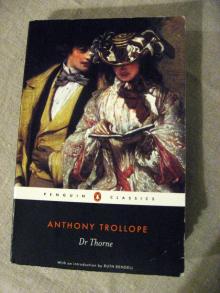 Doctor Thorne
Doctor Thorne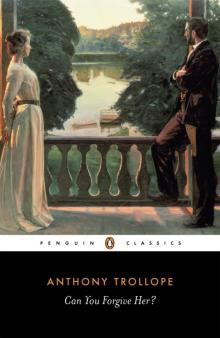 Can You Forgive Her?
Can You Forgive Her?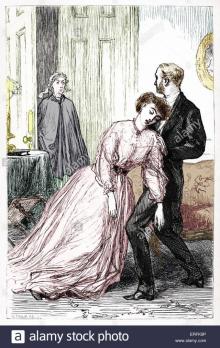 The Last Chronicle of Barset
The Last Chronicle of Barset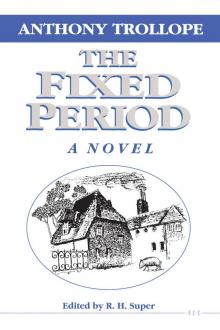 The Fixed Period
The Fixed Period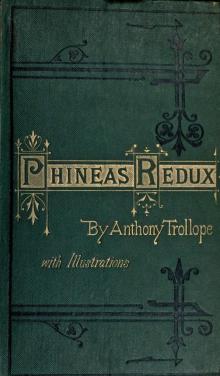 Phineas Redux
Phineas Redux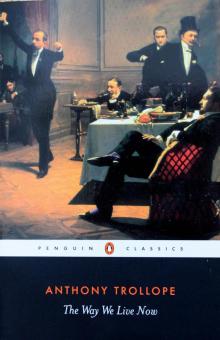 The Way We Live Now
The Way We Live Now Castle Richmond
Castle Richmond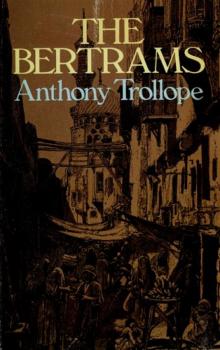 The Bertrams
The Bertrams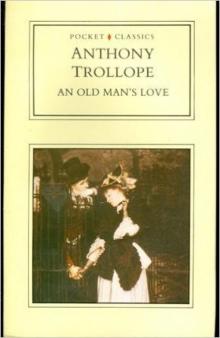 An Old Man's Love
An Old Man's Love The Belton Estate
The Belton Estate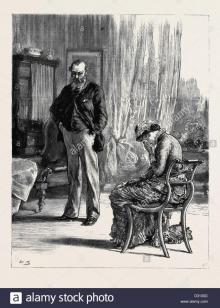 Marion Fay: A Novel
Marion Fay: A Novel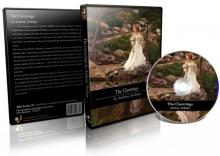 The Claverings
The Claverings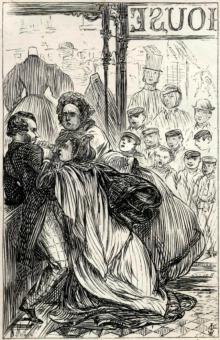 The Struggles of Brown, Jones, and Robinson
The Struggles of Brown, Jones, and Robinson Nina Balatka
Nina Balatka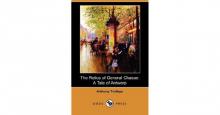 The Relics of General Chasse: A Tale of Antwerp
The Relics of General Chasse: A Tale of Antwerp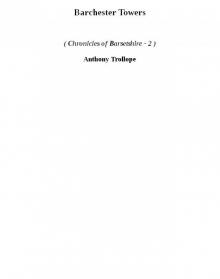 Barchester Towers cob-2
Barchester Towers cob-2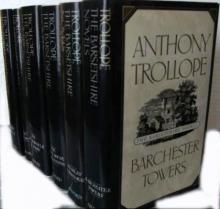 The Chronicles of Barsetshire
The Chronicles of Barsetshire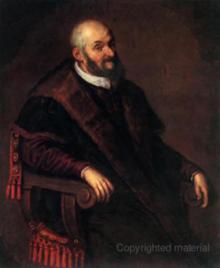 The Warden cob-1
The Warden cob-1 Framley Parsonage
Framley Parsonage Christmas at Thompson Hall
Christmas at Thompson Hall The Warden
The Warden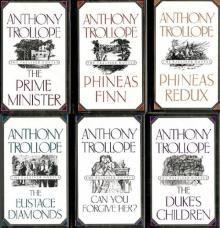 The Palliser Novels
The Palliser Novels The Small House at Allington
The Small House at Allington Barchester Towers
Barchester Towers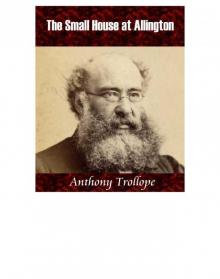 The Small House at Allington cob-5
The Small House at Allington cob-5 The Duke's Children
The Duke's Children Phineas Finn, the Irish Member
Phineas Finn, the Irish Member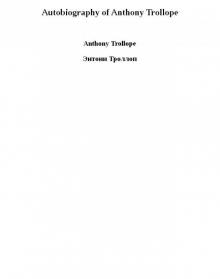 Autobiography of Anthony Trollope
Autobiography of Anthony Trollope